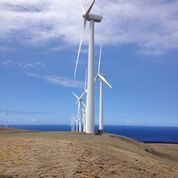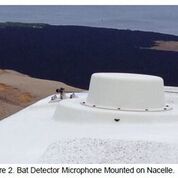KAILUA-KONA — The public will be afforded opportunity to speak on behalf of several types of endangered species, which may be harmed due to operations at two wind turbine facilities on Hawaii Island. ADVERTISING KAILUA-KONA — The public will be
KAILUA-KONA — The public will be afforded opportunity to speak on behalf of several types of endangered species, which may be harmed due to operations at two wind turbine facilities on Hawaii Island.
The Department of Land and Natural Resources has set a public hearing to field testimony regarding draft Pakini Nui and Lalamilo Habitat Conservation Plans. The hearing, held by the DLNR Division of Forestry and Wildlife, is scheduled for 5:30 p.m. this evening at the Hawaii Gateway Energy Center at. the Natural Energy Laboratory of Hawaii Authority in Kailua-Kona.
Two companies, Tawhiri Power LLC and Lalamilo Wind Company LLC, have applied for 20-year incidental take licenses (ITLs) to operate wind energy facilities at their respective sites. The definition of incidental take includes any manner of harm or harassment to an endangered species.
Were the companies to obtain ITLs, those licenses would absolve them of legal consequences for any accidental harm operations might cause an endangered species.
“If a wind company continued to operate after denial of a permit, any unauthorized take would be considered unlawful and could result in federal and state fines and penalties,” said Katherine Cullison, Pacific Cooperative Studies Unit Division of Forestry and Wildlife.
Tawhiri operates the 21-megawatt wind energy facility at South Point, which comprises 14 turbines and accompanying power lines. The facility, operational since April 2007, had observed the deaths of two endangered Hawaiian hoary bats due to operations between then and March, according to a DLNR press release.
The company has concluded incidental take of Hawaiian petrel, band-rumped storm petrel and Hawaiian goose (nene) may also occur due to site operations.
Cullison said no fatalities of these three species have been confirmed. However, Hawaiian hoary bats are known to live in the area, and based on radar surveys, petrels are likely to fly over the site. She added nene have not been observed at the site to this point.
As part of the jabitat conservation plan agreement, Tawhiri would impose low wind speed curtailment, make improvements to the Hawaiian hoary bat habitat at the Kahuku Unit of Hawaii Volcanoes National Park, help to maintain a cat-proof fence surrounding a petrel nesting colony at the park, and donate money to state efforts to aid in nene recovery.
The Lalamilo facility in South Kohala, which includes five turbines and accompanying power lines and has a net generating capacity of 3.3 megawatts, has concluded there exists the possibility for incidental intake of two species at its wind energy site — the Hawaiian hoary bat and the Hawaiian petrel.
As part of its habitat conservation plan agreement, Lalamilo would engage in the same mitigation efforts put forth by Tawhiri, but at a different level of effort corresponding with take, according to the DLNR release.
Info: https://dlnr.hawaii.gov/wildlife/files/2013/09/8-Pakini-Nui-draft-HCP.pdf.




